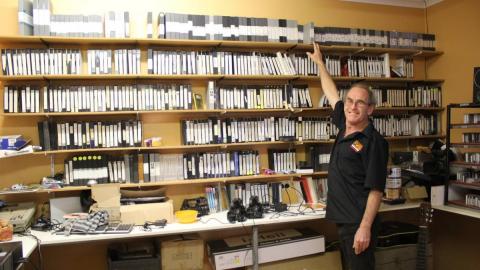
Thursday, May 12, 2016
IRCA Board and staff extends their congratulations to Neil Turner on reaching an incredible milestone of 20 years as Manager at PAKAM. Neil has made a huge contribution to the remote Indigenous media sector since its earliest years.
Neil was invited to move to Broome in 1996 where he facilitated and coordinated the establishment of PAKAM in 1998. He was commissioned by National Indigenous Media Association Australia to do the National Report on BRACS in 1997, where he traveled the country meeting with RIMOs and BRACS operators all over Australia. The final report, known as ‘The Turner Report’ was completed in 1998 and contributed to the Digital Dreaming report.
Neil’s achievements at PAKAM(link is external) include the launch of PAKAM satellite radio network in 2000, connecting RIBS stations and major town stations, and producer of several large documentary Productions: ‘Nyawa, Kulila, Wangka’ (Look, listen, Speak) about community broadcasting in the Pilbara Kimberley region (1997); Peeping through the Louvres’ (1998); and the recent Songlines projects ‘Tjawa Tjawa’ (2015). PAKAM were also a founding contributor to the establishment of Indigenous Community Television (ICTV) and Neil has played an active role in its ongoing development. He was also a part of the NITV working group to establish NITV in 2005-6. Neil was awarded the Mr McKenzie Award at the 16th NRIMF in 2014 in recognition of his contribution to community television.
This followed 12 years in the APY lands of SA at Ernabella Video and television (EVTV) and PY Media(link is external) from 1984 to 1996. Neil started out coordinated the development of EVTV’s cultural recording program and local TV broadcasting service. He then oversaw the establishment of the regional media organisation PY Media from 1986. Being a fluent Pitjantjatjara speaker, Neil has been invited back to do translations on documentary projects, including ‘Ngangkari’ (2001) and to coordinate cultural projects such as Ngaanyatjarra Media’s ‘Minyma Kutjarra Tjukurpa’ (Two Sister Story, 2009).